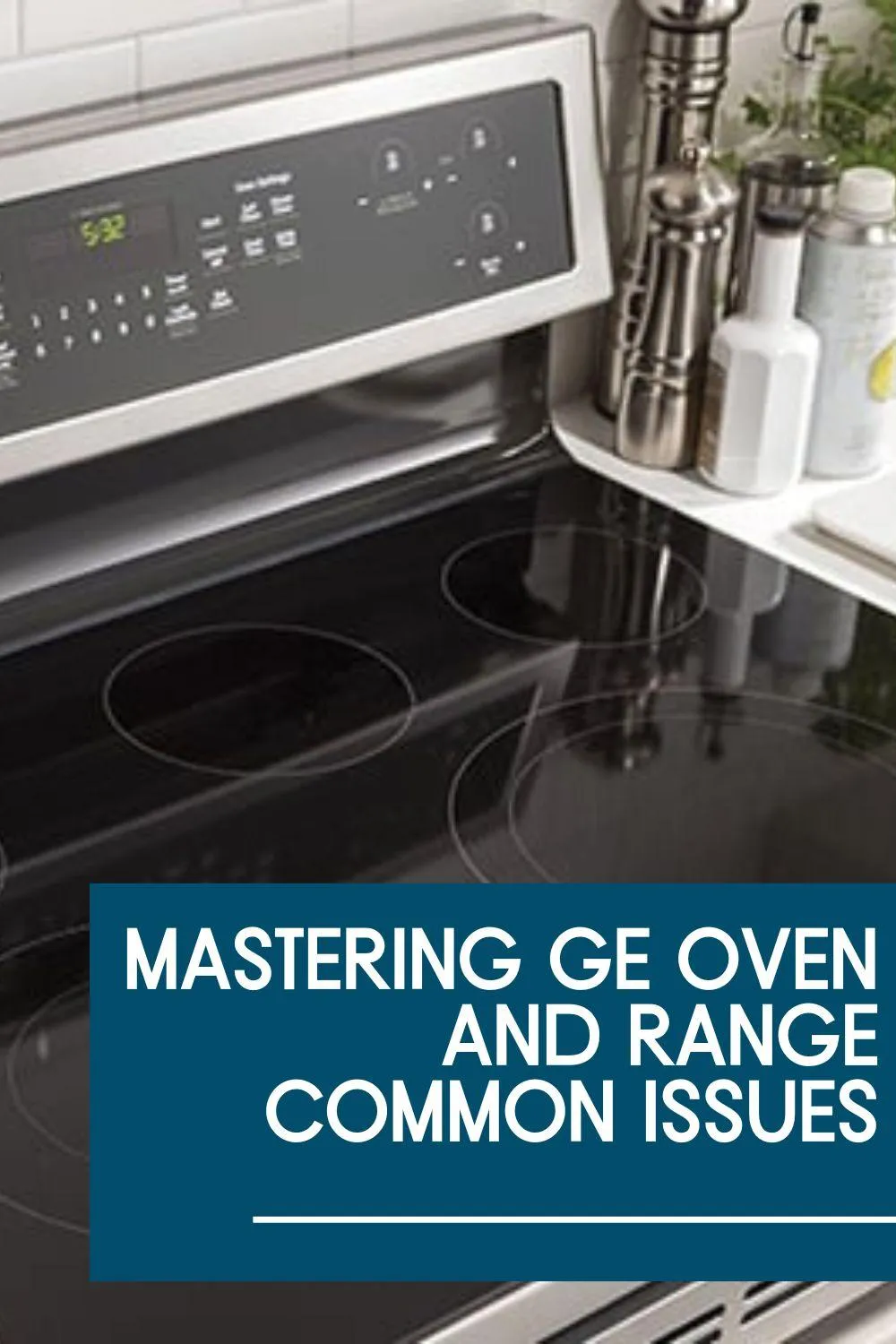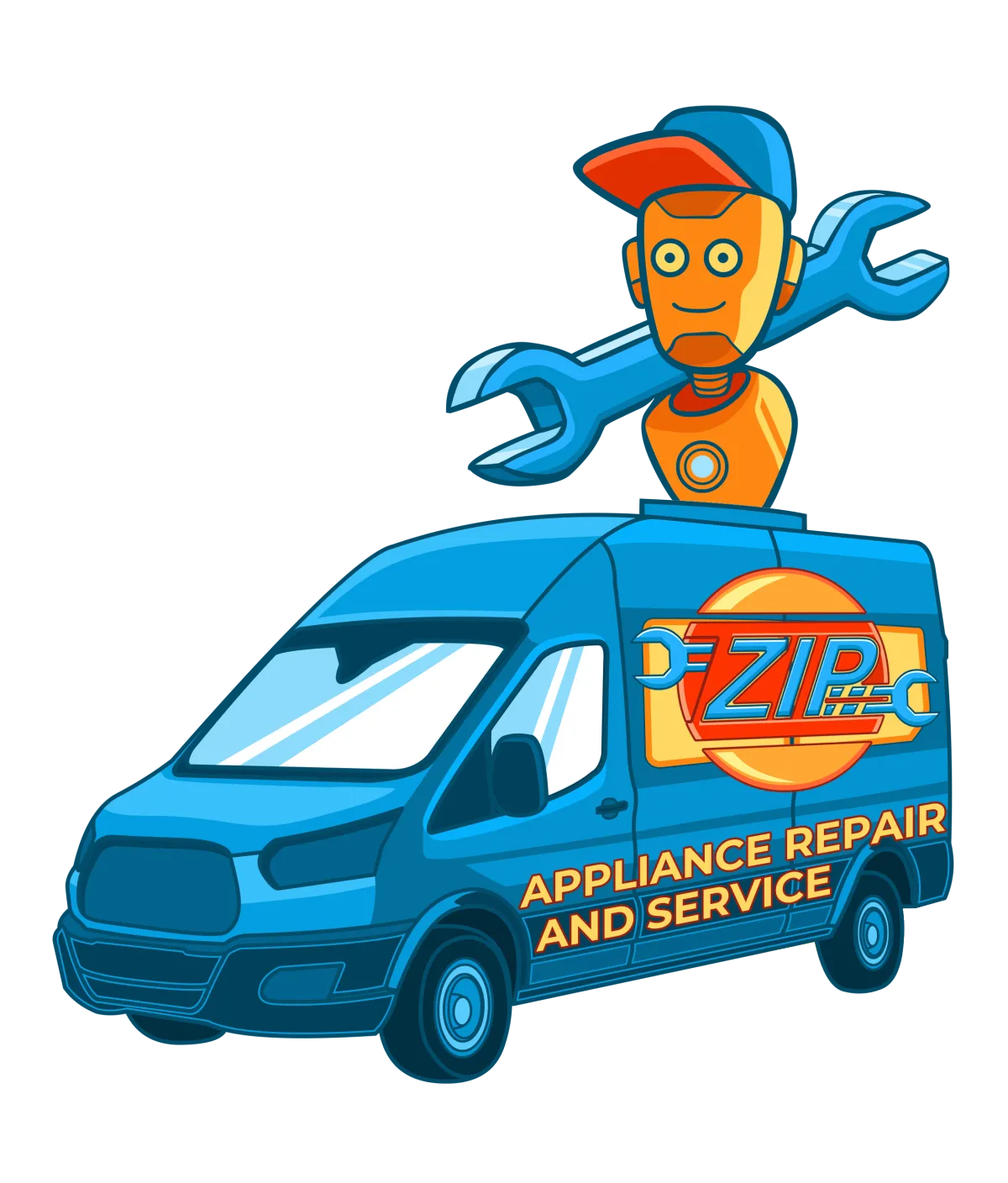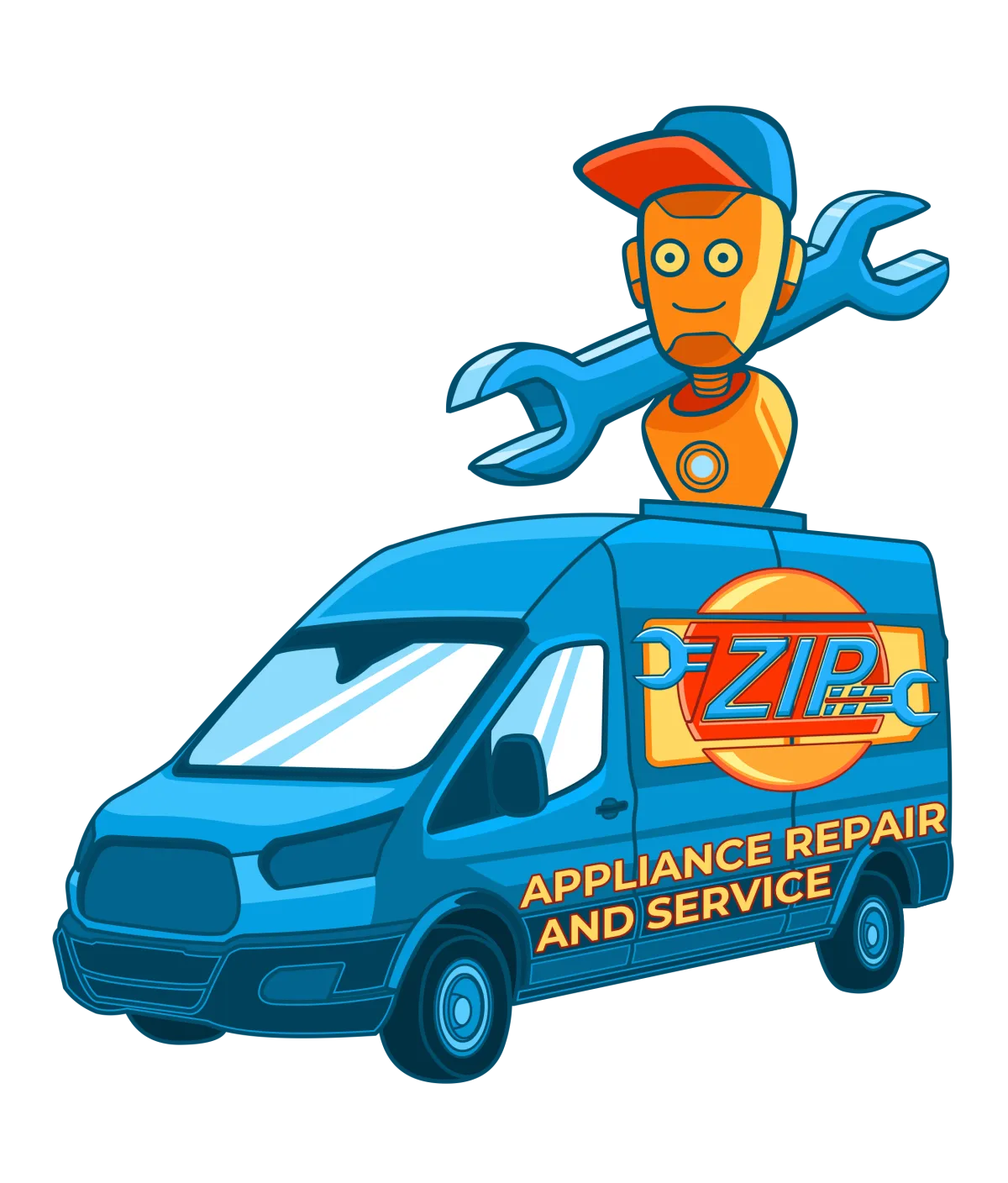THE FASTEST TOOLS IN TOWN
ZIP APPLIANCE REPAIR & SERVICE
Phone: (559) 272-4265
Phone: (559) 272-4265
Appliance Repair Tips For Fresno, CA Residents

GE Oven and Range Common Issues: What Every Homeowner Should Know
Mastering your kitchen repairs starts here: GE Oven and Range Common Issues—what every homeowner should know to keep their appliances running smoothly. - Appliance Boss
Introduction
Your GE oven and range are indispensable appliances in your kitchen, ensuring that meals are prepared efficiently and deliciously. However, like all machines, they can encounter problems. Understanding these issues and their solutions can save you time, money, and stress. This guide will explore common problems with GE ovens and ranges, offering practical solutions and preventative measures to keep your appliances running smoothly.
Overview of Common Issues with GE Ovens and Ranges
GE ovens and ranges are known for their reliability, but occasional issues can arise. Common problems include uneven cooking, burners that won't light, and malfunctioning controls. By identifying and addressing these issues early, homeowners can avoid costly repairs and ensure their appliances function optimally.

Why Understanding These Issues Matters for Homeowners
For homeowners, being aware of common appliance problems allows for quicker troubleshooting and more informed decisions about repairs or replacements. Knowledge empowers you to maintain your appliances better, potentially extending their lifespan and avoiding inconvenient breakdowns.
Identifying Common Problems with GE Ovens
Uneven Cooking: Causes and Solutions
Uneven cooking can be frustrating, often resulting in dishes that are overcooked on one side and undercooked on the other. This issue may be due to a malfunctioning heating element, a faulty temperature sensor, or poor oven calibration. To address uneven cooking, check that the heating elements are working correctly, and ensure that the oven is properly calibrated. Rotating trays and using a baking stone can also help distribute heat more evenly.
The Oven Not Heating: What to Check First
When your oven fails to heat, it could be due to several issues. Start by checking the power supply to ensure the appliance is plugged in and receiving electricity. Inspect the circuit breaker to see if it has tripped. If the power is fine, the problem may lie with the heating element or thermostat. Replace any faulty components to restore proper heating.
Self-Cleaning Cycle Issues: Why It Might Fail
The self-cleaning cycle is a convenient feature, but it can sometimes fail. Common reasons include a malfunctioning door latch or an issue with the heating element. Ensure the door is properly closed during the cycle and check for any obstructions. If problems persist, you may need to consult a professional to inspect and repair the system.
Oven Door Problems: Gaps and Seals
Gaps around the oven door can lead to heat loss, inefficient cooking, and increased energy bills. Inspect the door seal for damage or wear and replace it if necessary. Ensure that the door closes tightly and properly aligns with the oven frame.
Electric vs. Gas Ovens: Common Troubleshooting Tips
Electric and gas ovens have different components and troubleshooting steps. For electric ovens, check the heating elements and thermostat. For gas ovens, ensure the igniter and gas valve are functioning correctly. Familiarize yourself with the specific requirements of your oven type to address issues effectively.
Diagnosing Common Issues with GE Ranges
Burners Not Lighting: Potential Causes
If the burners on your GE range won't light, the issue could be a clogged burner port, a malfunctioning igniter, or a faulty electrode. Clean the burner ports and ensure the igniter is sparking. If these steps don't resolve the issue, inspect the electrode or seek professional help.
Inconsistent Heat Distribution: What to Look For
Inconsistent heat distribution can affect cooking results. This issue may be caused by clogged burner ports or an uneven burner surface. Regularly clean the burner components and check for any obstructions that could disrupt heat flow.
Range Controls and Buttons: When They Malfunction
Malfunctioning controls or buttons can prevent you from setting the desired temperature or operating the range properly. Inspect the control panel for visible damage and ensure the buttons are not sticking. If the issue persists, you may need to replace the control panel or consult a technician.
Gas Odor: Safety Concerns and Solutions
A gas odor is a serious safety concern and should be addressed immediately. Check for gas leaks around the range and ensure that all connections are secure. If you smell gas, turn off the gas supply, ventilate the area, and contact a professional for assistance.
Range Surface Issues: Scratches and Stains
Scratches and stains on the range surface can be unsightly and difficult to clean. Use non-abrasive cleaners and tools to avoid damaging the surface. Regular cleaning and protective measures can help maintain the appearance of your range.
Detailed Troubleshooting for GE Ovens
Checking the Igniter: How It Affects Heating
The igniter is crucial for lighting the gas in a gas oven. If the oven isn't heating, check the igniter for visible damage or wear. A faulty igniter may need to be replaced to restore proper functionality.
Examining the Temperature Sensor: Ensuring Accuracy
The temperature sensor monitors the oven temperature and ensures it matches the set value. If the sensor is malfunctioning, it can lead to inaccurate cooking temperatures. Test the sensor for proper resistance and replace it if needed.
Inspecting the Heating Element: Identifying Problems
The heating element is responsible for generating heat in electric ovens. If it's not working properly, you may experience uneven cooking or no heat at all. Inspect the element for signs of damage or wear and replace it if necessary.
Evaluating the Oven Thermostat: Common Failures
The thermostat regulates the oven temperature. A malfunctioning thermostat can cause cooking inconsistencies. Test the thermostat for accuracy and calibrate or replace it as needed.
Addressing Oven Error Codes: What They Mean
Oven error codes provide diagnostic information about issues with your appliance. Consult the user manual to understand the meaning of specific codes and follow the recommended troubleshooting steps.
Comprehensive Troubleshooting for GE Ranges
Fixing Burner Ignition Problems: A Step-by-Step Guide
If burners won’t ignite, follow these steps: clean the burner ports, check the igniter, and ensure proper gas flow. If these actions don’t resolve the issue, the igniter or electrode may need replacement.
Dealing with Temperature Fluctuations: Tips and Tricks
Temperature fluctuations can impact cooking results. Ensure that the burner ports are clean and unobstructed. Regular maintenance and proper loading of the oven can help maintain consistent temperatures.
Repairing Faulty Control Panels: Solutions and Advice
A faulty control panel can affect the operation of your range. Inspect the panel for damage and test the buttons for proper function. If the control panel is malfunctioning, it may need to be repaired or replaced by a professional.
Cleaning Tips for Maintaining Your GE Oven and Range
Regular Cleaning Routines: Keeping Your Appliances Pristine
Regular cleaning helps maintain the performance and appearance of your GE oven and range. Wipe down surfaces after each use, and perform a thorough cleaning periodically to prevent buildup and stains.
Best Practices for Oven and Range Care
Follow these best practices for optimal care: use appropriate cleaners, avoid abrasive tools, and address spills and stains promptly. Proper care can extend the lifespan of your appliances and enhance their efficiency.
Preventing Common Issues: Tips for Longevity
Preventative measures can reduce the likelihood of common issues. Regularly inspect and clean your appliances, avoid overloading, and use them according to the manufacturer's guidelines.
When to Call a Professional for Repairs
Signs Your Appliance Needs Expert Help
Certain signs indicate that professional help is needed, such as persistent issues despite troubleshooting, unusual noises, or gas leaks. When in doubt, consult a technician to avoid further damage or safety hazards.
Choosing a Reliable Repair Service for GE Appliances
Selecting a reputable repair service ensures that your appliances are fixed correctly and efficiently. Look for certified technicians with experience in GE appliances and check customer reviews for reliability.
Cost Considerations: Repair vs. Replacement
When deciding whether to repair or replace your appliance, consider the cost of repairs versus the cost of a new unit. Evaluate the extent of the damage and the age of your appliance to make an informed decision.
Preventative Measures
Routine Maintenance Tips: Keeping Problems at Bay
Routine maintenance, such as regular cleaning and inspections, can prevent many common issues. Develop a maintenance schedule to keep your appliances in top condition and avoid unexpected problems.
Seasonal Checks: Preparing Your Appliances for Different Conditions
Perform seasonal checks to ensure your appliances are prepared for different conditions. For example, inspect seals and connections before winter to prevent issues caused by temperature fluctuations.
Conclusion
Recap of Common Issues and Key Solutions
Understanding common issues with GE ovens and ranges and their solutions can help you maintain your appliances effectively. Regular maintenance and prompt troubleshooting can prevent major problems and extend the lifespan of your equipment.
Final Thoughts on Maintaining Your GE Oven and Range
Proper care and timely repairs are essential for keeping your GE oven and range in excellent condition. By staying informed and proactive, you can enjoy reliable performance and delicious meals for years to come.
Contact Information for Professional Assistance
For expert assistance with your GE oven and range, contact Zip Appliance Repair and Service at fresno.ziprepairservice.com or call (559) 272-4265. Our experienced technicians are ready to help you with any appliance issues.

GE Oven and Range Common Issues: What Every Homeowner Should Know
Mastering your kitchen repairs starts here: GE Oven and Range Common Issues—what every homeowner should know to keep their appliances running smoothly. - Appliance Boss
Introduction
Your GE oven and range are indispensable appliances in your kitchen, ensuring that meals are prepared efficiently and deliciously. However, like all machines, they can encounter problems. Understanding these issues and their solutions can save you time, money, and stress. This guide will explore common problems with GE ovens and ranges, offering practical solutions and preventative measures to keep your appliances running smoothly.
Overview of Common Issues with GE Ovens and Ranges
GE ovens and ranges are known for their reliability, but occasional issues can arise. Common problems include uneven cooking, burners that won't light, and malfunctioning controls. By identifying and addressing these issues early, homeowners can avoid costly repairs and ensure their appliances function optimally.

Why Understanding These Issues Matters for Homeowners
For homeowners, being aware of common appliance problems allows for quicker troubleshooting and more informed decisions about repairs or replacements. Knowledge empowers you to maintain your appliances better, potentially extending their lifespan and avoiding inconvenient breakdowns.
Identifying Common Problems with GE Ovens
Uneven Cooking: Causes and Solutions
Uneven cooking can be frustrating, often resulting in dishes that are overcooked on one side and undercooked on the other. This issue may be due to a malfunctioning heating element, a faulty temperature sensor, or poor oven calibration. To address uneven cooking, check that the heating elements are working correctly, and ensure that the oven is properly calibrated. Rotating trays and using a baking stone can also help distribute heat more evenly.
The Oven Not Heating: What to Check First
When your oven fails to heat, it could be due to several issues. Start by checking the power supply to ensure the appliance is plugged in and receiving electricity. Inspect the circuit breaker to see if it has tripped. If the power is fine, the problem may lie with the heating element or thermostat. Replace any faulty components to restore proper heating.
Self-Cleaning Cycle Issues: Why It Might Fail
The self-cleaning cycle is a convenient feature, but it can sometimes fail. Common reasons include a malfunctioning door latch or an issue with the heating element. Ensure the door is properly closed during the cycle and check for any obstructions. If problems persist, you may need to consult a professional to inspect and repair the system.
Oven Door Problems: Gaps and Seals
Gaps around the oven door can lead to heat loss, inefficient cooking, and increased energy bills. Inspect the door seal for damage or wear and replace it if necessary. Ensure that the door closes tightly and properly aligns with the oven frame.
Electric vs. Gas Ovens: Common Troubleshooting Tips
Electric and gas ovens have different components and troubleshooting steps. For electric ovens, check the heating elements and thermostat. For gas ovens, ensure the igniter and gas valve are functioning correctly. Familiarize yourself with the specific requirements of your oven type to address issues effectively.
Diagnosing Common Issues with GE Ranges
Burners Not Lighting: Potential Causes
If the burners on your GE range won't light, the issue could be a clogged burner port, a malfunctioning igniter, or a faulty electrode. Clean the burner ports and ensure the igniter is sparking. If these steps don't resolve the issue, inspect the electrode or seek professional help.
Inconsistent Heat Distribution: What to Look For
Inconsistent heat distribution can affect cooking results. This issue may be caused by clogged burner ports or an uneven burner surface. Regularly clean the burner components and check for any obstructions that could disrupt heat flow.
Range Controls and Buttons: When They Malfunction
Malfunctioning controls or buttons can prevent you from setting the desired temperature or operating the range properly. Inspect the control panel for visible damage and ensure the buttons are not sticking. If the issue persists, you may need to replace the control panel or consult a technician.
Gas Odor: Safety Concerns and Solutions
A gas odor is a serious safety concern and should be addressed immediately. Check for gas leaks around the range and ensure that all connections are secure. If you smell gas, turn off the gas supply, ventilate the area, and contact a professional for assistance.
Range Surface Issues: Scratches and Stains
Scratches and stains on the range surface can be unsightly and difficult to clean. Use non-abrasive cleaners and tools to avoid damaging the surface. Regular cleaning and protective measures can help maintain the appearance of your range.
Detailed Troubleshooting for GE Ovens
Checking the Igniter: How It Affects Heating
The igniter is crucial for lighting the gas in a gas oven. If the oven isn't heating, check the igniter for visible damage or wear. A faulty igniter may need to be replaced to restore proper functionality.
Examining the Temperature Sensor: Ensuring Accuracy
The temperature sensor monitors the oven temperature and ensures it matches the set value. If the sensor is malfunctioning, it can lead to inaccurate cooking temperatures. Test the sensor for proper resistance and replace it if needed.
Inspecting the Heating Element: Identifying Problems
The heating element is responsible for generating heat in electric ovens. If it's not working properly, you may experience uneven cooking or no heat at all. Inspect the element for signs of damage or wear and replace it if necessary.
Evaluating the Oven Thermostat: Common Failures
The thermostat regulates the oven temperature. A malfunctioning thermostat can cause cooking inconsistencies. Test the thermostat for accuracy and calibrate or replace it as needed.
Addressing Oven Error Codes: What They Mean
Oven error codes provide diagnostic information about issues with your appliance. Consult the user manual to understand the meaning of specific codes and follow the recommended troubleshooting steps.
Comprehensive Troubleshooting for GE Ranges
Fixing Burner Ignition Problems: A Step-by-Step Guide
If burners won’t ignite, follow these steps: clean the burner ports, check the igniter, and ensure proper gas flow. If these actions don’t resolve the issue, the igniter or electrode may need replacement.
Dealing with Temperature Fluctuations: Tips and Tricks
Temperature fluctuations can impact cooking results. Ensure that the burner ports are clean and unobstructed. Regular maintenance and proper loading of the oven can help maintain consistent temperatures.
Repairing Faulty Control Panels: Solutions and Advice
A faulty control panel can affect the operation of your range. Inspect the panel for damage and test the buttons for proper function. If the control panel is malfunctioning, it may need to be repaired or replaced by a professional.
Cleaning Tips for Maintaining Your GE Oven and Range
Regular Cleaning Routines: Keeping Your Appliances Pristine
Regular cleaning helps maintain the performance and appearance of your GE oven and range. Wipe down surfaces after each use, and perform a thorough cleaning periodically to prevent buildup and stains.
Best Practices for Oven and Range Care
Follow these best practices for optimal care: use appropriate cleaners, avoid abrasive tools, and address spills and stains promptly. Proper care can extend the lifespan of your appliances and enhance their efficiency.
Preventing Common Issues: Tips for Longevity
Preventative measures can reduce the likelihood of common issues. Regularly inspect and clean your appliances, avoid overloading, and use them according to the manufacturer's guidelines.
When to Call a Professional for Repairs
Signs Your Appliance Needs Expert Help
Certain signs indicate that professional help is needed, such as persistent issues despite troubleshooting, unusual noises, or gas leaks. When in doubt, consult a technician to avoid further damage or safety hazards.
Choosing a Reliable Repair Service for GE Appliances
Selecting a reputable repair service ensures that your appliances are fixed correctly and efficiently. Look for certified technicians with experience in GE appliances and check customer reviews for reliability.
Cost Considerations: Repair vs. Replacement
When deciding whether to repair or replace your appliance, consider the cost of repairs versus the cost of a new unit. Evaluate the extent of the damage and the age of your appliance to make an informed decision.
Preventative Measures
Routine Maintenance Tips: Keeping Problems at Bay
Routine maintenance, such as regular cleaning and inspections, can prevent many common issues. Develop a maintenance schedule to keep your appliances in top condition and avoid unexpected problems.
Seasonal Checks: Preparing Your Appliances for Different Conditions
Perform seasonal checks to ensure your appliances are prepared for different conditions. For example, inspect seals and connections before winter to prevent issues caused by temperature fluctuations.
Conclusion
Recap of Common Issues and Key Solutions
Understanding common issues with GE ovens and ranges and their solutions can help you maintain your appliances effectively. Regular maintenance and prompt troubleshooting can prevent major problems and extend the lifespan of your equipment.
Final Thoughts on Maintaining Your GE Oven and Range
Proper care and timely repairs are essential for keeping your GE oven and range in excellent condition. By staying informed and proactive, you can enjoy reliable performance and delicious meals for years to come.
Contact Information for Professional Assistance
For expert assistance with your GE oven and range, contact Zip Appliance Repair and Service at fresno.ziprepairservice.com or call (559) 272-4265. Our experienced technicians are ready to help you with any appliance issues.
If your dryer has been giving you problems, contact Zip Appliance Repair & Service at (559) 272-4265

Appliance Repair In A Zip
If you need a dryer repair call our Team at (559) 272-4265, or visit our online scheduling page to request service.
Appliance Repair
HAVE A QUESTION, CALL (559) 272-4265

Online Offers
Take advantage of our online discount offers - save time and money...

Residential & Commercial appliances
See what our company can do for you

Appliance Repair Tips
If your appliance is not working properly...

1405 Commercial Way ste 100
Bakersfield, CA 93309
Lic # 1116346
Equipment We Sevice
- A Call To Confirm Your Appointment Time
- A Email Detailing Your Assigned Technician
- Information Needed Before The Repair Can Be Started
- An Estimate Of Work To Be Done
© 2025 ZIP APPLIANCE REPAIR & SERVICE LLC







